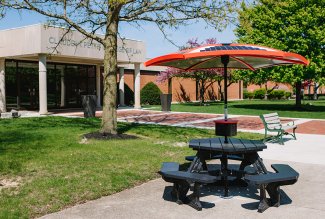
Ohio Northern University’s commitment to a sustainable future is evident in the numerous energy projects implemented across campus in recent years. Even more “green” upgrades are on the horizon for the University, says Jason Broge, vice president for financial affairs.
“We have been focused on reducing our footprint, especially when it comes to electricity usage,” explained Broge. “In addition to being good for the environment, these changes help drive down the University’s operational costs.”
Here is the progress made thus far and what’s coming:
Building automation/controls. Working with PlugSmart, an Ameresco company, ONU installed an automation and control system in approximately 90 percent of campus facilities. With this system in place, ONU staff can remotely monitor and control the energy utilization in each building.
“ONU previously had just three electrical meters for the entire campus, so we had no way of knowing how much energy each building was using. Now we can monitor energy usage, and be alerted of any energy spikes that may indicate a problem,” explained Raymond Closson, construction project coordinator.
In addition to enabling ONU to quickly identify energy spikes caused by equipment failure, the system allows staff to remotely adjust HVAC and heating levels to reduce energy usage during academic breaks when buildings are not in use.
The system-provided long-range data also aids administrators with future projections and decision-making on campus energy usage, says Broge, adding that the new system is on track to reduce ONU’s kilowatt usage by 11 percent annually.
Campus-wide lighting upgrade. Last year, ONU completed the conversion of all exterior lighting, as well as the interior lighting in several major buildings, from halogen and incandescent lighting to LED lighting. Not only are LED lights brighter and longer-lasting, they are more energy efficient. In total, 10,162 lighting fixtures on campus were retrofitted. Broge estimates $400,000 in savings annually due to the lighting upgrade.
Solar field. ONU contracted with AEP Energy several years ago on a 3-megawatt (annually) solar field on 11 acres of University property located southwest of campus. The 18,000 panels—surrounded by a chain link fence—are maintained and operated by AEP Energy. ONU utilizes approximately 7-8 percent of the energy produced by the solar field.
Solar-powered picnic tables. ONU students have a new option for gathering and collaborating outdoors with the installation of four solar-powered picnic tables this summer. LED panels on the picnic tables’ umbrellas capture the sun’s energy to power USB ports that can charge laptops, cell phones and tablets.
EV charging stations. ONU has eight electric vehicle (EV) charging stations on campus. The University first installed two charging stations about five years ago and eventually added two more. In 2022, ONU brought the number of stations to eight, and replaced existing ones so they are all the same strength and brand: 220-volt, Level 2 ChargePoints.
The EV charging stations are available for use by faculty, students and campus guests. Closson and Broge can remotely monitor the usage of ONU’s EV charging stations. As more people make the switch to hybrid or electric vehicles, ONU will take steps to add more charging stations on campus and possibly upgrade to Level 3 superchargers, says Broge.
“Right now, utilization (of the EV charging stations) is strong, but not overburdened,” he explained. “But we will continue to monitor the usage and put in place additional and faster EV charging stations when we start to see that demand grow, which I estimate will be in about two to three years from now.”
More ONU EV charging stations details are included in this story.
Wind turbines. ONU installed three wind turbines on the west end of campus in 2010 that stopped working in recent years and were no longer serviceable. After removing the turbines last summer, ONU contracted with an energy company to install and maintain two larger replacement turbines in the same location.
Broge explained that with the rapid advancements in turbine technology, the two new turbines will generate more energy than the three previous turbines combined. Due to high demand and supply chain issues, Broge does not expect the new wind turbines to arrive and be installed until 2024 or 2025.
Electric lawn equipment. Last summer, ONU purchased its first electric, zero-turn lawn mower for the campus grounds crew. The Mean Green EVO mower has a 72-inch sweep deck and is powered solely by electric charge, creating zero polluting emissions.
Broge says ONU plans to gradually convert all the campus grounds equipment, from utility vehicles to lawn mowers to leaf blowers, from gasoline/diesel to electric. Right now, the pricing on electric grounds equipment is elevated due to supply and demand, while at the same time, manufacturers are making rapid advancements in technology.
“I anticipate the technology will improve and pricing will come down in the very near future,” says Broge. “When that happens, we will be ready to make the switch.”
Natural landscaping. ONU continues to explore opportunities to integrate natural landscaping in the 342-acres of land that comprises the main campus. This approach to grounds maintenance seeks to reduce the usage of harmful chemicals to control weeds and pests, while incorporating more wild areas and native plants to support a healthy ecosystem, especially vital pollinators.
Currently, a grassy area surrounding the retention basin on the south side of campus is a prairie area with natural vegetation—flowering shrubs, trees and wildflowers. It provides a perfect habitat for 10 beehives and does not need to be mowed.
While Broge notes the growing popularity and benefits of natural landscaping, he admits that many people, ingrained with the societal ideal of perfectly manicured green lawns, are not there yet aesthetically.
“It takes time and it’s a balancing act,” he explains. “But certainly, as a society, we are on the cusp of change.”
Many of ONU’s sustainability efforts have been encouraged and/or financially supported by ONU alumnus Jim Halderman, BSEd ’68, a retired technology and industrial arts educator and a leading advocate for innovation and sustainability.